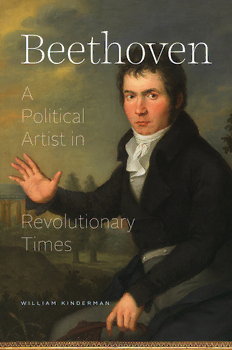
Beethoven: A Political Artist in Revolutionary Times PDF
Preview Beethoven: A Political Artist in Revolutionary Times
Beethoven Beethoven A Political Artist in Revolutionary Times W i l l i a m K i n d e r m a n The UniversiTy of ChiCago Press / ChiCago and London The University of Chicago Press, Chicago 60637 The University of Chicago Press, Ltd., London © 2020 by The University of Chicago All rights reserved. No part of this book may be used or reproduced in any manner whatsoever without written permission, except in the case of brief quotations in critical articles and reviews. For more information, contact the University of Chicago Press, 1427 E. 60th St., Chicago, IL 60637. Published 2020 Printed in the United States of America 29 28 27 26 25 24 23 22 21 20 1 2 3 4 5 isBn- 13: 978- 0- 226- 66905- 2 (cloth) isBn- 13: 978- 0- 226- 66919- 9 (e- book) doi: https://doi.org/10.7208/chicago/9780226669199.001.0001 Library of Congress Cataloging-in-Publication Data Names: Kinderman, William, author. Title: Beethoven : a political artist in revolutionary times / William Kinderman. Description: Chicago : The University of Chicago Press, 2020. | Includes bibliographical references and index. Identifiers: LCCn 2020032956 | isBn 9780226669052 (cloth) | isBn 9780226669199 (e-book) Subjects: LCsh: Beethoven, Ludwig van, 1770–1827—Criticism and interpretation. | Beethoven, Ludwig van, 1770–1827— Political and social views. Classification: LCC ML410.B42 K606 2020 | ddC 780.92 [B]—dc23 LC record available at https://lccn.loc.gov/2020032956 This paper meets the requirements of ansi/niso Z39.48– 1992 (Permanence of Paper). For Daniel and Laura, Anna and Marie Contents Preface ix I A Tale of Two Cities: Bonn to Vienna 3 II The Sublime and Inverted Sublime 33 III Beethoven in Heiligenstadt 62 IV Path to the Eroica 84 V Leonore as “Angel of Freedom” 110 VI From Grätz to Wagram and Leipzig 140 VII A Double Chill: Beethoven in Metternich’s Vienna 167 VIII Then and Now: The Ninth Symphony 195 acKnoWledgments 222 list of illustrations and examPles 223 note about abbreviations 226 sources and documents 227 index 249 Preface Beethoven has long been regarded as among the greatest of com- posers, but it has been overlooked that he was also among the most political of artists. He lived through some of the most turbulent events in European history: the French Revolution, the Reign of Terror, the rise and fall of Napoleon Bonaparte, the battles of Wagram and Leipzig, the Congress of Vienna, and the ensuing era of political repression. He depended on the generous support of aristocratic sponsors, yet smashed the bust of Prince Lichnowsky in 1806 and kept a chilly distance from the Austrian emperor Franz. Beethoven was never reconciled with the absolutist politics of the Napoleonic period or its aftermath in the Metternich regime that held power in Austria until after the composer’s death in 1827. Two centuries later, Beethoven’s musical legacy retains an astonishing cultural presence. While we mark and move beyond the composer’s anniversary year 2020, a fresh investigation of the political importance of Beethoven’s artistic legacy seems timely. The political narratives that sustain his art contribute to its remarkable resilience. The background has to do with events much bigger than any individual. Coming of age in the progres- sive environment in Bonn, Beethoven enrolled in the recently founded Bonn University in 1789, just as revolution broke out in nearby France. Pursuing his musical career from 1792 in Vienna, he encountered an artistically rich yet politically reactionary sit- uation. His risky enthusiasm for Napoleon as First Consul of the French Republic soon cooled, yet Beethoven remained fascinated by Bonaparte, and saw himself as a competitor in the cultural sphere, a “Generalissimo” in the realm of tones. In later years, ix
